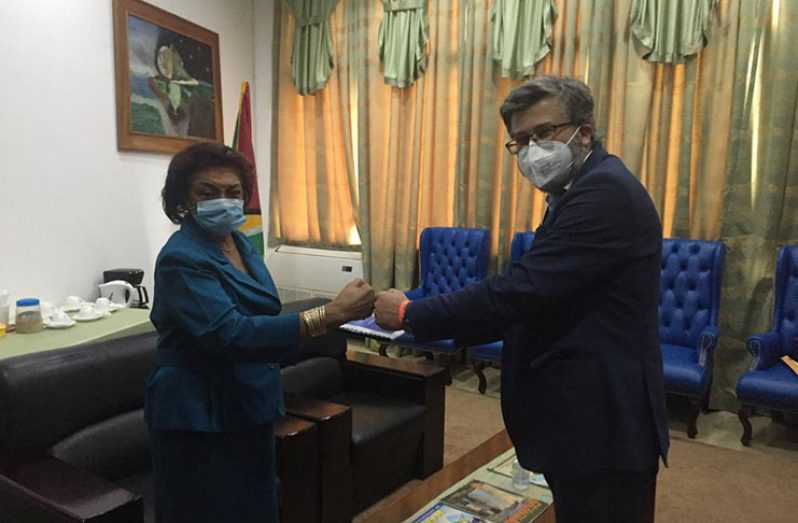THE European Union Election Observation Mission (EU EOM) has presented its final report on Guyana’s General and Regional Elections, noting several shortcomings by the Guyana Elections Commission (GECOM); political parties and other stakeholders.
The report was handed over by EU Ambassador to Guyana, Fernando Ponz Cantó to Chair of GECOM, Justice (Ret’d) Claudette Singh, on Friday. The Guyana Chronicle summarised some of the key pointed highlighted by the EU EOM.
FUNCTIONING OF GECOM
From its observation, the EU EOM said that “post-election developments exposed a dysfunctional commission unable to control its own secretariat.” It said that the commission’s deliberations, decisions, instructions and essential electoral data were not publicly accessible.
Meanwhile, it noted that the bipartisan composition of the commission resulted in excessive polarisation, affecting the commission’s ability to function, reach common ground and make timely decisions.
“By failing to take decisive action as the electoral process derailed into chaos and illegality, GECOM abdicated its constitutional duty to take all actions necessary to ensure compliance with the law by any of its officials, despite unequivocal powers to remove and exercise disciplinary control over them,” the mission stated.
CAMPAIGN FINANCING
The mission noted concerns regarding campaign financing, stating that the legal framework did not sufficiently provide for transparency, accountability and oversight. It also said the GECOM did not assume its oversight responsibility to monitor campaign finance.
Moving forward, it recommended that effective legislation could provide transparency in campaign incomes and establish reasonable limits for campaign expenditure. It said that this could also ensure disclosure and reporting requirements and effective sanctions guided by an independent oversight body.
ONLINE AND OFFLINE CAMPAIGNING
During the campaign trail, the EOM said that these were “intensely” dominated by the governing A Partnership for National Unity + Alliance For Change (APNU+AFC) and the opposing People’s Progressive Party Civic (PPP/C) but other smaller parties were “barely visible”.
The Mission highlighted that “vote buying in Indigenous communities” was done by both the APNU+AFC and PPP/C with the coalition doing so through development programmes and the opposition through State resources “namely vehicles” at regional level.
While acknowledging that there are no laws to guide online campaigning, the mission said that social platforms channelled massive amounts of derogatory messages, false narratives and racially-heated comments, contributing to confusion and division among Guyanese.
MEDIA MONITORING
While the mission observed that freedom of expression and the media were generally able to freely cover the electoral process, it noted that the media environment is highly politicised. “The media environment is highly politicised, with very few independent media and the majority of media outlets being either directly affiliated or leaning to one of the two main political camp,” the EOM stated.
The EU EOM also highlighted that although the Guyana National Broadcasting Authority (GNBA) was equipped with a permanent media monitoring unit, it informed the EOM that it did not have enough capacity to conduct a thorough monitoring of the election coverage.
On different occasions, it noted that the Guyana Press Association (GPA), denounced cases of journalists being subject to intimidation via social networks, direct intimidation and attempted physical assaults by party supporters and complained about the lack of effective measures to ensure media workers’ safety.
TABULATION AND PUBLICATION RESULTS
The EU EOM has also recommended the adopting of clear written procedures for the transmission and tabulation of election results to ensure consistency of the process in all regions. This includes adequate traceability of handed over electoral documents and possibility for all authorised stakeholders to examine Statements of Poll (SOPs) as required by law.
Meanwhile, it suggested incorporating into law the obligation to accompany any declaration of results by simultaneous publication of detailed polling station results and digital copies of all SOPs. Added to this, it was put forward that the number of valid votes cast for each candidate list should also include all elements of electoral accounting.
DISPUTE RESOLUTION SYSTEM
The EU EOM pointed out that: “Once the date of elections is officially announced, all election-related disputes, except for challenges related to voter and candidate registration, should be raised only after the elections by way of election petitions.”
It said that electoral dispute resolution mechanisms are available mainly through judicial dispensation but the right to an effective remedy is not ensured as there are no deadlines for rendering decisions on electoral disputes.
It nonetheless commended the High Court and Court of Appeal for the way they dealt with the two critical post-election legal challenges.
Apart from these, EU EOM also acknowledged that a total of 660,998 voters were registered for the elections which is “well above the estimated resident adult population”. It positively noted that three out of nine presidential candidates and over 40 per cent of all candidates contesting the general elections were women but criticised that no voter education specifically targeted Indigenous people and not enough catering for the voting of Persons With Disabilities (PWDs).
RECOMMENDATIONS
For the next General and Regional Elections, the EU EOM recommended a review and consolidation of the “fragmented” election legislation; the launching of a consultation process to overhaul the composition and functioning of GECOM; the development of effective legislation to regulate political finance; the fostering of transparency and accountability in online and offline campaigning; the transformation of the state-owned media into a genuine public service broadcaster; the adoption of clear written procedures for transmission and tabulation of election results; the accompanying of any
declaration of results by simultaneous publication of detailed polling station results and digital copies of all Statements of Poll and the establishment of a comprehensive election dispute resolution system.
Following an invitation by the President of Guyana, the EU deployed the first-ever fully-fledged EU EOM, of 55 observers from 25 EU member states and Norway, to Guyana between from January 25 to March 20, 2020.
The EU EOM said that it was able to observe and report on all aspects of the election process until March 20, 2020 when it was repatriated to Europe due to the COVID-19 pandemic.












